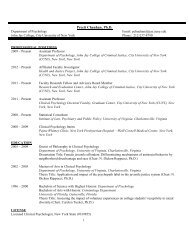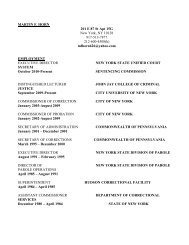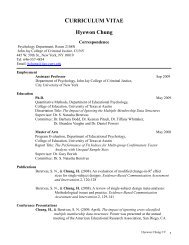Bulletin - John Jay College Of Criminal Justice - CUNY
Bulletin - John Jay College Of Criminal Justice - CUNY
Bulletin - John Jay College Of Criminal Justice - CUNY
Create successful ePaper yourself
Turn your PDF publications into a flip-book with our unique Google optimized e-Paper software.
Courses <strong>Of</strong>fered<br />
changing roles and expectations of men and women. Each of these<br />
interdisciplinary readings will be discussed within the framework of<br />
counseling theory.<br />
Prerequisites: ENG 102 or ENG 201, PSY 101, and junior standing<br />
or above<br />
CSL 381-382 Fieldwork in Human Service<br />
3 hours, 3 credits<br />
This course is an applied fieldwork experience in community-based<br />
Human Service programs and agencies. This course is designed to<br />
provide students the opportunity to develop a practical understanding<br />
of the human service delivery system and its relevance to local, state<br />
and national social service policy. Students draw connections<br />
between theory and practice and actively participate and support<br />
efforts to assist individuals and programs that address populations in<br />
need. The practicum experience heightens student awareness of the<br />
skills required of an effective human service provider and affords<br />
them the opportunity to determine their appropriateness for the<br />
profession. Students will provide 8-10 hours per week of service and<br />
attend assigned supervision meetings throughout the semester.<br />
Assigned readings, fieldwork logs and a culminating research<br />
paper/project will be required.<br />
Prerequisites: ENG 102 or 201, CSL 235, minimum GPA of 2.5, and<br />
permission of the instructor<br />
CRIMINAL JUSTICE (Department of<br />
Law, Police Science and <strong>Criminal</strong><br />
<strong>Justice</strong> Administration)<br />
CRJ 101 Introduction to <strong>Criminal</strong> <strong>Justice</strong><br />
3 hours, 3 credits<br />
An introductory survey of the American criminal justice system.<br />
Discussion of the police, defense and prosecuting attorneys, courts,<br />
institutional corrections, community-based corrections, and the<br />
juvenile justice system. The definition and the measurement of<br />
crime, and various efforts to explain the causes of crime. General<br />
issues for consideration include discretion in the administration of<br />
criminal justice, due process and contemporary change in the<br />
American criminal justice system.<br />
This course is the required prerequisite for all courses in the <strong>Criminal</strong><br />
<strong>Justice</strong> major.<br />
CRJ 236 Victimology<br />
(Same course as SOC 236)<br />
3 hours, 3 credits<br />
This course focuses on the victims rather than the offenders: why<br />
they have been “rediscovered” recently; why they often do not report<br />
crimes to the police; how some victims might share responsibility for<br />
the crimes with the offenders; how they can be repaid for their losses<br />
through offender restitution and government compensation; and what<br />
new services are available to help victims prevent crimes and resist<br />
attacks.<br />
Prerequisites: ENG 101, and CRJ 101 or ICJ 101<br />
CRJ 255 Computer Applications in <strong>Criminal</strong> <strong>Justice</strong><br />
3 hours, 3 credits<br />
This course provides an introduction to the basic principles of<br />
computing with respect to police information systems; computer<br />
automation with respect to the penal setting; Interagency <strong>Criminal</strong><br />
<strong>Justice</strong> Information Systems; National <strong>Criminal</strong> <strong>Justice</strong> Computer<br />
Systems; National Law Enforcement Telecommunications Systems<br />
(NLETS); the National Incident Based Reporting System (NIBRS);<br />
<strong>Of</strong>fender Based Transaction Statistics (OBTS); National Crime<br />
Information Center (NCIC); and other criminal justice databases.<br />
Legal and ethical implications for constituent elements and personnel<br />
of the criminal justice system are also discussed. Some familiarity<br />
with computers is recommended.<br />
Prerequisites: ENG 101, ENG 102 or ENG 201, and CRJ 101 or ICJ<br />
101<br />
70

















